- Home
- Hammond Innes
Campbell's Kingdom Page 7
Campbell's Kingdom Read online
Page 7
Creasy was coming back up the road towards us. He was dressed in a fleece-lined jacket and ski cap. ‘About time,’ he said. ‘This is a fair cow, this one.’ He looked across at me. ‘You haven’t wasted much time getting out here.’ He turned to the driver who was already in the back of the truck loosening the securing tackle of the bulldozer. ‘Okay, George. There’s a good snow bank over there. I’ll get some men on to it right away, then you back up and we’ll run her off same as we did the others.’
I left them to it and went down the road to where the bull-dozers were working. They had blasted back into the cliff face and the big D7s were hefting the rocks out with their broad blades and shovelling them over the edge, steadily building outwards. I stood on the lip of the road and stared up at the twin peaks of Solomon’s Judgment. From their summits powdery snow streamed lazily upward like smoke. Separating the two peaks was a narrow cleft, a dark gash in the mountain face, and across the upper end of it was wedged a shelf of rock like a wall. Something about that wall caught and held my gaze. Though it was breached in the centre it was too regular to be natural and it was of a lighter shade than the rock walls of the cleft.
‘Like to have a look through these?’ The driver was standing beside me and he was offering me a pair of binoculars. I focused them on the cleft and instantly the lighter coloured rock resolved itself into a wall of concrete. I was looking at a dam, completed except for the centre section.
‘When was that built?’ I asked the driver.
‘It was begun in the summer of 1939,’ he replied, ‘when the Government reckoned they’d need to open up the Larsen mines for the re-armament drive. They stopped work when the States came into the war. It became cheaper to get our ore from across the border, I guess. Now, of course, with the price of lead at the level it is today—’
‘They’re going to complete the dam—is that it? That’s what this road is for?’
He nodded. ‘You can just see the cable of the hoist if you look carefully. It runs up to a pylon at the top.’
I searched the cliff face and gradually made out the slender thread of the cable rising to a concrete pylon on the cliff top and snaking back to a squat housing to the left of the dam and a little above it.
I lowered the glasses, the truth slowly dawning on me. ‘Where exactly is Campbell’s Kingdom?’ I asked him.
‘Up there.’ He nodded towards the dam. ‘Just through the cleft.’
‘Where’s the boundary of the property?’
‘I wouldn’t know exactly.’
I turned as a bulldozer thrust a great pile of blast-shattered rock towards the lip of the road. They’d been so damned sure I’d sell that they’d started the work without even waiting for me to sign the deeds.
I looked round. Creasy was standing a little way up the road. I got the impression he had been watching me. No wonder they’d been worried last night. Anger boiled up inside me. If they’d given me the details, if they’d explained that there was a dam three-quarters built already . . . I went over to him. ‘Who ordered you to build this road?’ I demanded.
‘That any of your business?’ His tone was sullen.
‘This road is being built to bring material up to complete the dam, isn’t it?’ I asked. ‘And if the dam is on my property—’
‘It isn’t on your property.’
‘Well, where’s the Campbell land start?’
‘Just the other side of the dam.’ He turned away and moved towards the face of the overhang. ‘Looks like we got to do some more blasting,’ he said to his foreman. I followed him over and listened to him giving instructions to the driller. The compressed air unit started up with a roar and the drills began to eat into the rock. Above the din I shouted, ‘You still haven’t told me who you’re building this road for?’
He turned on me angrily. ‘Suppose you leave me to get on with it. I’m paid to build the damned thing, not to answer a lot of questions. You may own old Campbell’s Kingdom, but this is Trevedian land and what happens down here is nothing to do with you.’
‘I think it is,’ I said.
‘All right. Then go and talk to Peter Trevedian and stop worrying me. Blasting this stuff isn’t as easy as it looks.’ He turned his back on me and shouted instructions to his drillers. Somebody yelled at me to get out of the way and a bulldozer started towards the lip of the road, thrusting about five tons of rubble in front of its blade.
I walked back up the road a bit and stood looking up to the cleft in the mountain they called Solomon’s Judgment. The sound of the bulldozers eating their way relentlessly towards the Kingdom echoed in my ears. I hadn’t expected anything like this. I might just as well have signed the deeds of sale, borrowed on the result and spent a few, pleasant carefree months travelling.
The driver shouted to me that he was leaving and I went slowly back up the road and climbed into the cab beside him. Back in Come Lucky I dropped off at the office of the Trevedian Transport Company, but it was locked and I went on to the hotel. There were several old men in the bar drinking beer. They turned as I entered and stared at me curiously. ‘Do you know where I’ll find a man called Peter Trevedian?’ I asked one of them.
‘Sure. Over to Keithley Creek. He and Jamie McClellan went in early this morning.’
I sat down at one of the marble-topped tables and got the Chinaman to bring me a beer. I didn’t know what to do for the best. It seemed absurd to try and stop the completion of a dam that was two-thirds built for the sake of a dead man’s whims. And yet . . . I found myself thinking back to that one meeting I had had with my grandfather. There must have been something in it surely for a man to come back here and spend the rest of his life up in that mountain fastness. As I sat drinking my beer it occurred to me it was about time I had a word with Acheson. I got up and went across to where old Mac sat with several of his cronies. ‘Can I use your phone?’
He looked up at me. ‘Aye, ye can use it,’ he said. ‘But ye’ll no’ contact anybody. The line’s been down for a week past.’ He smiled dourly. ‘Ye see, there’s only two subscribers in Come Lucky now—meself and Trevedian. The company dinna worry over much about us.’
I went back to my seat and ordered another beer. I had a sudden sense of being cut off. A bell rang in the depths of the hotel and the Chinaman came to tell me dinner was ready. As I got to my feet a man pushed open the street door and came in. He was short and dark, with black hair and a smooth, coppery skin. There was something arresting in the way he threw open the door and stood there, looking round the room. But it was the scar that made me look at him more closely. It ran all across the right side of his face, from the corner of his lip to his ear, half of which was missing. It didn’t exactly disfigure his face, but it gave a queer twist to features that were almost classic in their cleanness of line, the jaw hard and square, the forehead broad and the nose sharply chiselled and quite straight. ‘Hiya, Mac.’ He came forward into the bar, a pleasant, cheerful smile on his face that disclosed the even line of very white teeth. He carried a leather grip and the backs of his hands were marked with the dark purple of burns.
Old Mac got to his feet and shook his hand. ‘It’s grand to see you, Boy.’ There was real pleasure in the old man’s voice. ‘Jean was only saying the other day it was time you came back for your trucks.’
‘She’s still here then?’
‘Aye.’
‘Are they through to the hoist yet?’
‘Not quite. But they’ll no’ be long now. Creasy’s working through the fall right this minute.’ Mac shook his head. ‘It was bad luck that fall. How did you make out this winter?’
The other grinned. ‘Oh, not too bad. Went wildcatting with a bunch of hoodlums up in the Little Smoky country. Have you got a room for me? I guess I’ll stay up here now until the hoist’s working and I can get my trucks down.’
‘Aye, there’s a room for ye. And ye’re just in time for dinner.’
‘Well, thanks, but I thought I’d go and scrounge a meal off J
ean.’
‘Ye think the lass has been pining for ye, eh?’ The old man poked him in the ribs.
‘I wouldn’t know about that,’ the other grinned. ‘But I’ve been pining for her.’
Their laughter followed me as I went through into the kitchen. When Mac came in I asked him who the newcomer was. ‘That was Boy Bladen,’ he said.
‘Bladen?’
‘Aye. He’s the laddie who did the survey up in the Kingdom last summer.’
Bladen! ‘. . . Bladen was keen, as keen as Stuart.’ I could hear old Roger Fergus’s words still. It seemed that providence had delivered Bladen into my hands for the sole purpose of discovering the truth about that survey.
‘. . . and he had to abandon all his equipment, leave it up in the Kingdom all winter,’ old Mac was saying. ‘You saw that fall they were clearing when you went up the road today?’ I nodded. ‘Well, that happened just before he was due to come down.’ He shook his head sadly. ‘That’s tough on a boy, all his capital locked up in a place like that. Never had anything but trouble from the Kingdom,’ he growled.
‘About that survey,’ I said. ‘Did my grandfather know the result of it?’
‘No. He went and died while the letter containing the report was waiting for him down here in my office. It would just about have killed him anyway.’
After the meal I went up to my room and lay on the bed and smoked and tried to think the thing out.
It was shortly after four that I heard James McClellan shouting for his father. If he was back, presumably Trevedian was too. I got up, put on my coat and went down through the hard-packed snow to the bunkhouse. The door of the transport company’s office was ajar and as I climbed the wooden steps I heard the sound of voices. I hesitated, my hand on the knob of the door. ‘. . . you should have thought of that before you took your trucks up there.’ The man’s tone was easy, almost cheerful. ‘If I weren’t clearing that fall and rebuilding the road you’d never get them out. I’ve got a lot of dough tied up in—’
I was just turning away when another voice cut in, harsher and less controlled. ‘You may own the valley, but you’ve only a half share in the hoist. McClellan’s got some say in—’
‘McClellan will do what I tell him,’ the other replied. ‘You do as I say and you’ll get your trucks down.’
‘God damn you, Trevedian!’ The door flung open and Bladen came out, pushing past me and walking angrily up the slope towards Come Lucky.
I knocked and went in. The office was small and bare and dusty. An old-fashioned telephone stood on a desk littered with papers and cigarette ash and behind the desk sat a stocky man of about forty-five. The bone of his skull showed through the close-cropped, grizzled hair and, since it was a round, solid head jammed close in to the shoulders on a short neck, it bore a remarkable resemblance to those concrete balls that adorn the gate pillars of Victorian houses. But though the head was round, the position of cheek bones and jaw gave the features length, so that with the long nose and rather pursed lips under the clipped grey moustache the features seemed to lose some of the strength of the head. The eyes were black and they had little pouches of loose grey flesh under them. He was like a fine Rugby scrum-half gone to seed, and yet the heaviness of his body wasn’t fat, for, apart from the greyness of his skin, he looked fit. ‘Mr Peter Trevedian?’ I asked.
He rose to greet me. ‘You must be Bruce Wetheral.’ His hand was hard and rough, the smile of welcome rubber-stamped on his leathery features. ‘Sit down. James told me you’d arrived. Cigarette?’ He produced a silver cigarette case from the pocket of his jacket and held it out to me. ‘You’re Campbell’s heir, I understand.’ He flicked his lighter for me and his small, black eyes were fastened on my face.
I nodded.
‘Well, I think I can guess why you’ve come to see me.’ He smiled and sat back in his chair with a grunt. ‘Fact is I was just coming up to have a talk with you.’ He lit his cigarette and blew out a cloud of smoke. ‘I’ll be quite frank with you, Wetheral, your refusal to sell the Kingdom has put me in a bit of a spot. As you probably know, through my holding in the Larsen mines, I’ve got the contract for supplying all materials for the completion of the Solomon’s Judgment dam. But the contract is a tricky one. The dam has to be completed this summer. To get all the materials up on the one hoist I had to be in a position to begin packing the stuff in the moment the construction people were ready to start work on the dam. To do that I had to have the road cleared ready. I couldn’t wait for the okay from Fergus. So I took a chance on it.’
‘A bit risky, wasn’t it?’ I said.
He shrugged his shoulders. ‘If you want to make money out here you’ve got to take risks. If I’d waited for Fergus’s okay, I’d have been too late to pack all the stuff in on the one hoist. I’d have had to build a second hoist and believe me that would have cost a lot at current prices.’ He leaned back. ‘Well now, what are you holding out for—more dough?’ The unwinking stare of his black little eyes was disconcerting.
‘No,’ I said. ‘It’s not that.’
‘What is it then? Mac said something about your planning to live up there.’
‘Yes.’
‘What the hell for? It’s pretty God-damn lonely up there and in the winter—’
‘My grandfather lived up there,’ I said. ‘If he could do it—’
‘Campbell didn’t live there because he liked it,’ he cut in sharply. ‘He lived there because he had to; because he didn’t dare live down here amongst the folk he’d swindled.’
‘Are you suggesting he was a crook?’ I demanded angrily. He leaned forward and stubbed his cigarette out in a big quartz ash-tray. ‘See here, Wetheral. You know Campbell’s history as well as I do. He was committed to trial and sentenced by an English jury for fraud. If I remember right he got five years. To that jury it was just a Stock Exchange ramp. But out here it was the last gamble of men trying to recoup themselves for the loss of the Come Lucky mine. They believed in Campbell. Maybe I’m a bit bitter. Perhaps you’ll understand my attitude better if I tell you that my father, Luke Trevedian, backed Campbell when he decided to drill up beyond the cleft of Solomon’s Judgment. Most of the old-timers were with him in that venture. Well, it failed. The rock was hard, it cost more than they budgeted to get equipment up there. When they found they’d bitten off more than they could chew Campbell went to England to raise capital. My father put every last penny he possessed into the Rocky Mountain Exploration Company and when he got the news that Morton, the director brought in by your grandfather as financial adviser, had disappeared with all the capital, he got on his horse and rode out into the snow of a winter’s night. We never saw him again.’
‘I’m sorry,’ I said.
He laughed. ‘No need to be sorry. It was his own fault for being such a sucker. I’m telling you this so you’ll understand why old Campbell lived up in the Kingdom. You don’t want to take too much notice of the newspaper stories. That’s just tourist stuff and I’ll admit he put on a good act for them. But the truth lies here in Come Lucky. This derelict bunch of shacks is his doing. There was a lot of wealth here in this town when the big slide sealed the mine.’ He lit another cigarette and snapped his lighter shut by closing his fist on it as though he meant to crush it. ‘And it isn’t only the town that’s derelict,’ he added. ‘Take a look at the old men around here. They’re all old-timers, men who put their money into Campbell’s oil companies and now eke out a pittance doing a bit of farming down on the flats around Beaver Dam Lake. They just about fill their bellies and that’s all.’
There was nothing I could say. He was giving me the other side of the picture and the violence in his voice emphasised that it was the truth he was telling me. It explained so much, but it didn’t make my problem any easier.
‘Well,’ he said, ‘what are you going to do? If you sell the Kingdom, then Henry Fergus will go ahead with the hydro-electric scheme and Come Lucky will become a flourishing little town again.’
‘And if I don’t?’ I asked.
He hesitated. ‘I don’t know. It just depends.’ He got up and walked over to the window. For a time he stood there, staring up the straggling length of Come Lucky’s main street. Then he turned suddenly to me. ‘This place is what they call a ghost town. You’ve got a chance to bring it back to life.’
‘My grandfather’s will imposed certain obligations on me,’ I said. ‘You see, he still believed—’
‘Obligations, hell!’ he snapped. He came and stood over me. ‘Suppose you go and think this thing over.’ He was looking down at me, his eyes slightly narrowed, the nerves at the corners quivering slightly. ‘I phoned Henry Fergus this morning when I was in Keithley. I tried to get him to increase his offer to you.’
‘It’s not the money,’ I said.
‘Well, maybe.’ He smiled sourly. ‘But money’s a useful commodity all the same. He’s coming up to see the progress they’re making at Larsen. I suggested he came on up here and had a talk with you. He said he would.’ His hand dropped to my shoulder. ‘Think it over very carefully, will you. It means a lot to the people here.’
I nodded and got to my feet. ‘Very well,’ I said. ‘I’ll think it over.’
‘Yes. Do that.’
When I got back to the hotel it was tea time. There was an extra place laid at the big deal table and just after we’d sat down Bladen came in. Several times in the course of the meal I noticed James McClellan looking at me out of the corners of his eyes. He didn’t eat much and as soon as the meal was over he hurried out, presumably down to Trevedian to discover the result of our interview. I went over to Bladen. ‘Can I have a word with you?’ I asked him.

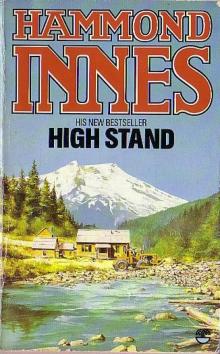 High Stand
High Stand The Doomed Oasis
The Doomed Oasis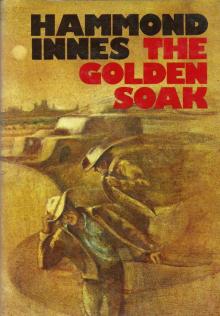 Golden Soak
Golden Soak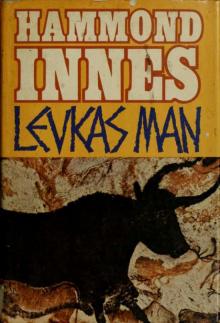 Levkas Man (Mystery)
Levkas Man (Mystery)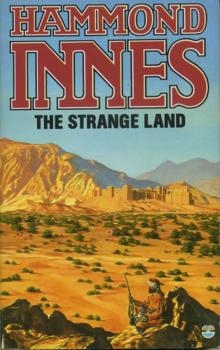 The Strange Land
The Strange Land Dead and Alive
Dead and Alive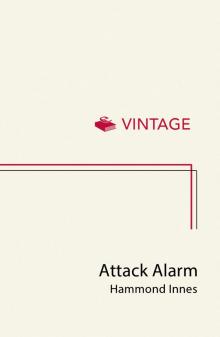 Attack Alarm
Attack Alarm The Strode Venturer
The Strode Venturer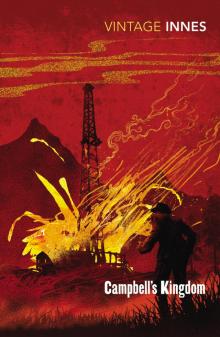 Campbell's Kingdom
Campbell's Kingdom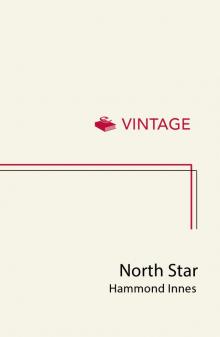 North Star
North Star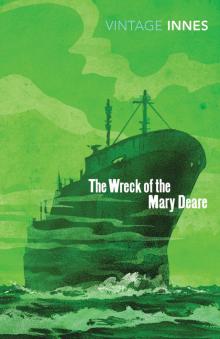 The Wreck of the Mary Deare
The Wreck of the Mary Deare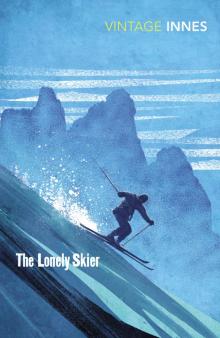 The Lonely Skier
The Lonely Skier The Black Tide
The Black Tide The Trojan Horse
The Trojan Horse Medusa
Medusa Air Bridge
Air Bridge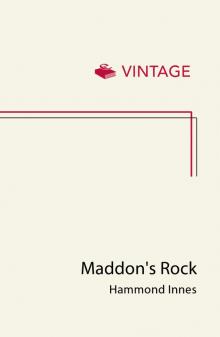 Maddon's Rock
Maddon's Rock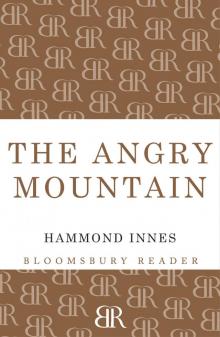 The Angry Mountain
The Angry Mountain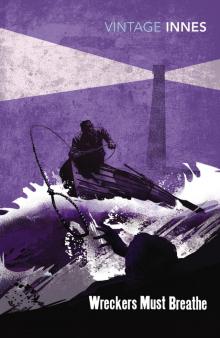 Wreckers Must Breathe
Wreckers Must Breathe Solomons Seal
Solomons Seal The White South
The White South